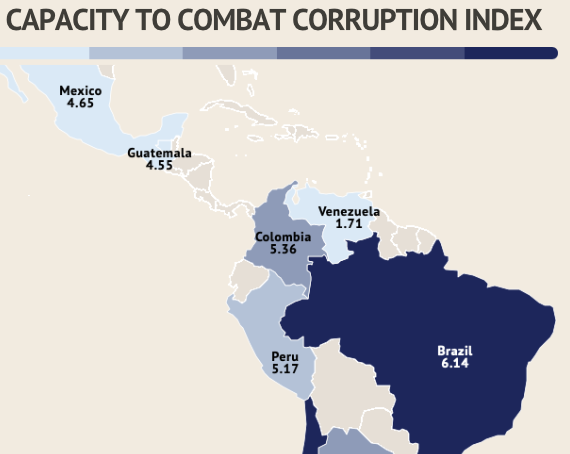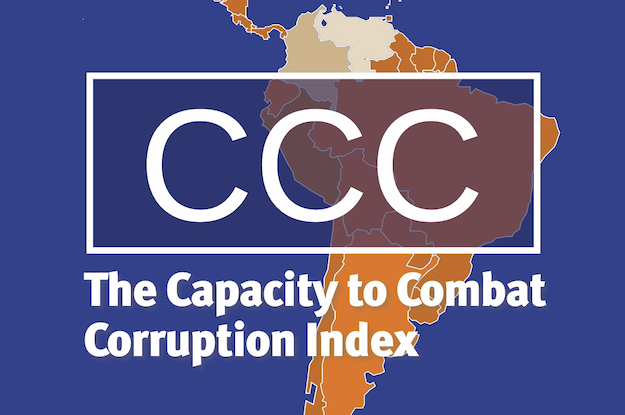Which countries in Latin America are best prepared to fight corruption? How are governments, media, civil society and the private sector fostering — or standing in the way of — a cleaner business environment?
To help answer these questions, AS/COA and the risk consulting firm Control Risks are launching the Capacity to Combat Corruption (CCC) Index, a new tool assessing Latin America’s ability to uncover, punish and deter corruption.
Rather than measuring perceived levels of corruption, the CCC Index evaluates and ranks countries based on how effectively they are able to combat corruption. Countries with a higher score are deemed more likely to see corrupt actors prosecuted and punished.
The country with the highest overall score in the 2019 CCC Index is Chile (6.66 out of 10), meaning it is deemed the most likely country in the study for corruption to be uncovered, punished and deterred. Chile was followed by Brazil (6.14), a virtual tie between Colombia (5.36) and Argentina (5.33), Peru (5.17), Mexico (4.65), Guatemala (4.55) and, in a distant last place, Venezuela (1.71).
The CCC Index looks at 14 key variables, including the independence of judicial institutions, the strength of investigative journalism, and the level of resources available for combating white-collar crime. These variables are divided in three sub-categories: legal capacity; democracy and political institutions; and civil society, media and the private sector. Countries’ overall scores are a weighted aggregate of these three sub-categories.
The index relies on extensive data and on a proprietary survey conducted among leading anti-corruption experts from Control Risks, academia, civil society, media and the private sector.
The inaugural edition of the CCC Index covers Argentina, Brazil, Chile, Colombia, Guatemala, Mexico, Peru and Venezuela, which collectively represent almost 90 percent of Latin America and the Caribbean’s GDP.
 Click here to see a graphic version of the CCC
Click here to see a graphic version of the CCC
“An anti-corruption wave has been sweeping Latin America for the past five years, putting powerful figures in jail and shaping electoral outcomes. The CCC Index provides us a comparative tool to better understand this phenomenon and highlight why some countries have had greater success in facing the problem of systemic corruption,” said Roberto Simon, Senior Director of Policy at AS/COA.
According to Geert Aalbers, Senior Partner at Control Risks, the CCC Index offers businesses a comprehensive understanding of the nuanced compliance challenges in Latin America. “Companies are interested in how well-equipped countries are to combat corruption, and how effectively they are doing so,” said Aalbers. The CCC Index provides a perspective on how countries in Latin America are faring on this front and is designed to be read in combination with other key indices on corruption.
“Over time, greater levels of enforcement in the region will lead companies to investigate wrongdoing and invest more heavily in compliance measures, which will ultimately reinforce the creation of a more transparent business environment,” added Aalbers.
The CCC Index will be updated annually, tracking countries’ trajectories in the field of anti-corruption.
For the full results and methodology, download the 2019 CCC Index Report.






